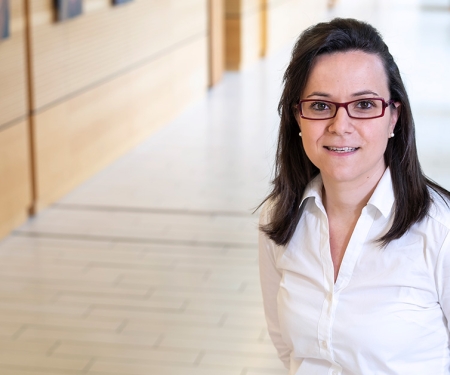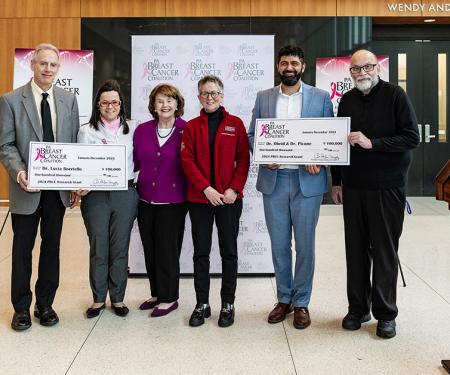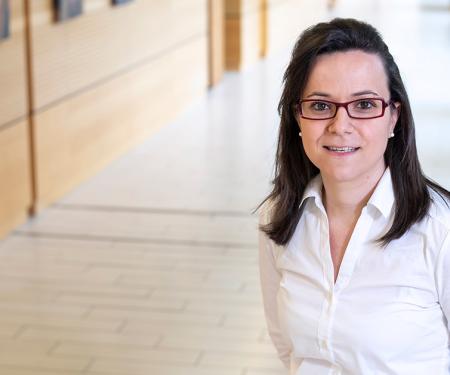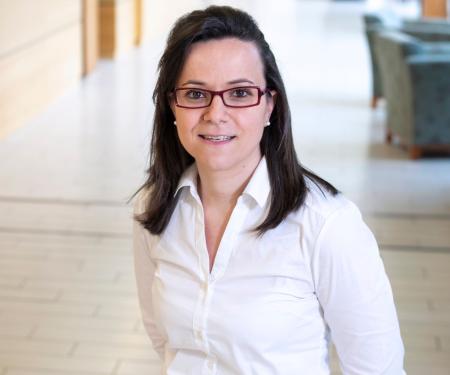Related Articles
00 / 00

Assistant Professor
Cancer and Cellular Biology
Despite advances in treatment, metastatic cancer remains largely incurable. Metastases can manifest months, years, or even decades after the removal of the primary tumor. This is because disseminated tumor cells (DTCs) that seed distant organs can survive in a non-proliferative state, referred to as “dormant state”. Metastatic growth occurs when tumor cells exit dormancy (a process called “awakening”) and resume proliferation. As such, dormancy and metastatic recurrence are responsible for deaths of cancer patients. Currently, there are no drugs to eradicate dormant tumor cells. This is because their biology is largely unknown.
The goal of the Borriello Laboratory is lab to understand how the tumor microenvironment regulates the mechanisms of dormancy and awakening of tumor cells in order to identify new therapies targeting dormant tumor cells and preventing metastatic disease. To this end, we use a multidisciplinary approach spanning multiplex immunofluorescence, organotypic culture, multiphoton intravital imaging, and in vivo models with the mission of developing novel therapeutic strategies to eradicate dormant tumor cells and combat mortality from metastasis
Currently, our lab focuses on two major questions in breast and lung cancer:
1. How do tumor cells enter dormancy in the primary tumor?
Patient data and mouse models of different cancer types demonstrate that tumor cell dissemination occurs even before primary tumor is clinically detectable, and these early disseminated tumor cells (DTCs) are dormant and contribute to metastasis. These data suggest that the dormancy program initiates in the primary tumor and is carried over by DTCs in distant organs. However, it is unclear how the primary tumor instructs tumor cells to enter dormancy. We recently demonstrated that particular microenvironmental niches, rich in macrophages, in the primary tumor educate tumor cells for dormancy (Borriello et al., Nature Communications 2022).
2. How do tumor cells exit dormancy at metastatic sites?
Tumor cells disseminate from the primary tumor and seed in distant organs, remaining dormant for many years. Upon unknown microenvironmental signals, DTCs exit dormancy and start to proliferate, leading to metastasis formation. However, the mechanisms and signaling that trigger DTCs to exit dormancy are poorly understood. The role of stromal cells in cancer progression and metastasis has been extensively demonstrated, but their contribution to the awakening of dormant DTCs has not been determined.
Our goal is to determine if fibroblast-derived soluble factors and extracellular vesicles induce DTCs to exit dormancy. The results of this project will identify new microenvironmental factors and signaling pathways that regulate awakening of dormant DTCs, and will provide new targets for therapeutic strategies to eliminate dormant cancer cells or to keep them in a perpetual dormant state.
Additional information about our research program can be found on our website: www.borriellolab.com
Key Research Articles On The Tumor Microenvironment, Cancer Progression, Dormancy And Metastasis:
Borriello L, Coste A, Traub B, Sharma V, Karagiannis GS, Yu L, Wang Y, Ye X, Duran C, Chen X, Friedman M, Sosa MS, Sun D, Dalla E, Singh Deepak, Oktay M, Aguirre-Ghiso J*, Condeelis JS*, Entenberg D*. Primary Tumor Associated Macrophages Activate Programs of Invasion and Dormancy in Disseminating Tumor Cells. Nature Communications, 2022 Feb 2;13(1):626.
Borriello L, Condeelis JS, Entenberg D, Oktay M. Breast Cancer Cell Re-Dissemination From Lung Metastases – a Mechanism for Enhancing Metastatic Burden. Journal of Clinical Medicine,2021. 27;10(11):2340.
SharmaV, TangB, Wang Y, KaragiannisG, XueE, EntenbergD, Borriello L, CosteA, Duran C, Eddy R, Kim G, Ye X, Jones J, Grunblatt E, Agi N, Roy S, Bandyopadhyaya G, Adler E, Surve C, Esposito D, Goswami S, Guo W, CondeelisJS,WakefieldL, OktayM. Live Imaging of Breast Tumors Shows Macrophage-Dependent Induction and TMEM-Mediated Enrichment of Cancer Stem Cells during Metastatic Dissemination. Nature Communications, 2021. Dec 15;12(1):7300
Borriello L, Nakata R, Shear MA, Fernandez E, Seeger R, Malvar J, Blavier L, Shimada H, Asgharzadeh S, Seeger R and DeClerck YA. Cancer-Associated Fibroblasts Share the Characteristics and Protumorigenic Activity of Mesenchymal Stromal Cells. Cancer Research,2017. 15;77(18):5142-5157.
Hadjidaniel M, Muthugounder S, Hung L, Shirinbak S, Chan R, Nakata R, Borriello L, Sheard M, Iwakura H, Akamizu T, Shimada H, Sposto R, DeClerck YA, Asgharzadeh S. Tumor Associated Macrophages Promote Tumor Growth Independent of IL6 in Murine Model of Neuroblastoma. Oncotarget,2017.16;8(53):91516-91529.
LifshitzV, PricemanS, LiW, CherryholmesG, LeeH, Makovski A, BorrielloL, DeClerckY, YuH. Sphingosine-1-Phosphate Receptor-1 Promotes Environment-Mediated and Acquired Chemoresistance. Molecular Cancer Therapy,2017.16(11):2516-2527.
Solari V, Borriello L, Turcatel G, Shimada H, Sposto R, Fernandez GE, Asgharzadeh S, Yates EA, Turnbull JE, DeClerck YA. MYCN-Dependent Expression of Sulfatase-2 Regulates Neuroblastoma Cell Survival. Cancer Research, 2014.1;74(21):5999-6009.
Major Review Articles On The Tumor Microenvironment, Cancer Progression, Dormancy And Metastasis:
Duran C, Borriello L, Karagiannis G, Entenberg D, Oktay M, Condeelis JS. Targeting Tie2 in the tumor microenvironment: from angiogenesis to dissemination. Cancers, 2021. Nov 16;13(22):5730.
Borriello L*, Karagiannis GS, Duran C, Coste A, Oktay M, Entenberg D* and Condeelis JS*. The Role of the Tumor Microenvironment in Tumor Cell Intravasation and Dissemination. *Corresponding authors – European Journal of Cell Biology, 2020. 99(6):151098.
Sanchez LR, Borriello L, Entenberg D, Oktay M, Condeelis JS, Karagiannis G. The Emerging Roles of Macrophages in Cancer Metastasis and Response to Chemotherapy. Journal of Leukocyte Biology,2019.106(2):259-274. PMID: 30720887
Zijlstra A, Von Lersner A, Yu D, Borriello L, Oudin M, Kang Y, Sahai E, Fingleton B, Stein U, Cox T, Price J, Kato Y, Welm A, Aguirre-Ghiso A. The Importance of Developing Therapies Targeting the Biological Spectrum of Metastatic Disease. Clinical and Experimental Metastasis,2019. 36(4):305-309. PMID: 31102066.
Borriello L, Seeger RC, Asgharzadeh S, DeClerck YA. More Than the Genes, the Tumor Microenvironment in Neuroblastoma. Cancer Letters, 2015.S0304-3835(15)00693. PMID: 26597947.
Borriello L and DeClerck Yves. Tumor Microenvironment and Therapeutic Resistance Process. Medecine Sciences, 2014.30(4):445-51. PMID: 24801042.
Key Articles On The Intravital Lung Imaging:
Borriello L, Traub B, Oktay M, Entenberg D. A Permanent Window for Investigating Cancer Metastasis to the Lung. Jove, 2021. Jul 1;(173). doi: 10.3791/62761.
Entenberg D, Voiculescu S, Guo P, Borriello L, Wang Y, Karagiannis GS, Jones J, Baccay F, Oktay M, Condeelis J. A Permanent Window for the Murine Lung Enables High-Resolution Imaging of Cancer Metastasis. Nature Methods, 2018. 15(1):73-80.
Post-doctoral positions are available in the Borriello laboratory, located in the Department of Cancer and Cellular Biology in the Lewis Katz School of Medicine, Philadelphia (US).
Our lab focuses on understanding the mechanisms of dormancy and metastatic recurrence, with a particular emphasis on the role of the tumor microenvironment. We use a multi-disciplinary approach to study the biology of metastasis, integrating cell signaling, biochemistry, molecular biology, multiplex tissue imaging, several mouse models, and in vivo intravital imaging.
The Borriello Lab is a new lab in the field of Cancer Dormancy & Metastasis and is seeking a highly motivated and enthusiastic postdoctoral fellow and research assistant to join the research team. We collaborate with investigators from both within the Lewis Katz School of Medicine and Fox Chase Cancer Center. We have access to state-of-the-art technologies in genomics, in vivo models and intravital imaging. The successful candidates will have the unique opportunity to work in a dynamic and stimulating academic environment, at a top-notch institution in the US. We are committed to building an inclusive environment that support professional development and scientific discoveries.
To learn more about our research please visit: https://www.borriellolab.com/
To apply, please submit a curriculum vitae, a brief summary of your research experience and why you are interested in our lab, and a list of three references to:
Lucia Borriello, PhD
Assistant Professor
[email protected]



